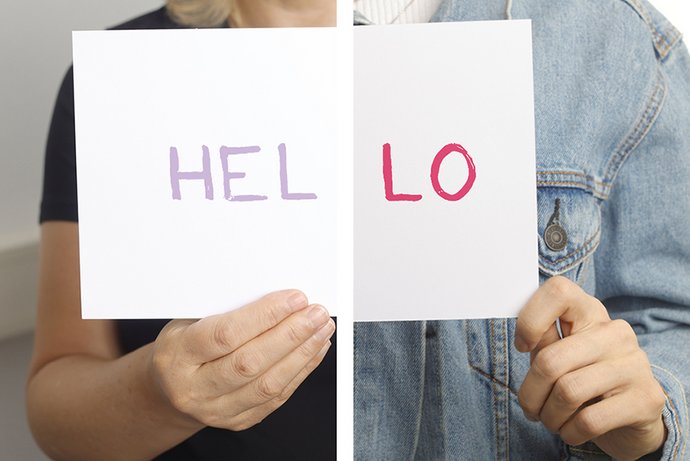Sila left her home country in 2005. She fled Turkey with her son because she was no longer safe there and had experienced traumatic events. She has been living in Germany ever since. Her life seems to be stabilizing here: She finds work, gets married and learns to speak German. But the security she builds up is deceptive. Her past never quite lets her go. The memories haunt her and the traumas she has experienced circle incessantly in her head. Sila senses that she needs help, but she is afraid of not being understood. Her feelings are overwhelming, but she doesn't have the words. How can she express in a foreign language what she doesn't really understand herself?
Growing demand
Sila is not alone. Thousands of people in Germany share her experiences. Like Sila, many people with a history of migration are reluctant to seek psychotherapeutic help. The search for therapy in their native language is often unsuccessful. In a society in which more and more people have a history of migration, the need for culturally sensitive and native-language care is constantly increasing.
At the same time, people with a history of migration often do not receive the same level of medical care. There are many reasons for this: a lack of intercultural openness on the part of medical institutions, language and comprehension problems, prejudice on both sides, experienced discrimination.
Overcoming barriers
A solution to this problem was sought at the CIMH: in 2023, Dr. Suna Su Aksay and her team founded the Transcultural Center. The aim is to integrate people with a history of migration into the care structures on an equal footing and take intercultural concerns into account in all areas of the CIMH.
A key component of this project is the introduction of a new care unit: the Transcultural Outpatient Clinic. It offers outpatient diagnostics and treatment for people with a history of migration, including refugees, in their native languages. The services offered range from open consultation hours and pharmacotherapy to psychotherapy and consultations for inpatients through to cross-clinic collaboration.
Responding to needs
The path to founding the Transcultural Outpatient Clinic began many years ago with the desire to better reach the large group of people of Turkish origin, particularly in Mannheim. Initially, it was the commitment of individual practitioners that provided the impetus. In 2020, the psychiatric outpatient clinic was expanded to include a Turkish-language consultation hour in order to specifically address their needs.
However, the changing global political situation also made new services necessary: a refugee outpatient clinic was established in 2015. In close cooperation with the head of the central outpatient clinic at the CIMH, Dr. Oliver Hennig, rapid and coordinated help was offered to newly arrived people. At the same time, the child and adolescent psychiatry department introduced a weekly consultation for minors with a refugee or migrant background. When the war in Ukraine began in 2022, a consultation hour for Ukrainian and Russian-speaking refugees was set up within a few days.
These steps paved the way for the Transcultural Outpatient Clinic, which emerged from the continuous exchange, motivation and support of the dedicated teams. As a result, the existing initiatives are now coordinated centrally and the services are being continuously expanded. Today, consultations are held in Arabic, German, English, Russian, Turkish and Ukrainian. In addition, (telephone) interpreters help with other languages so that communication problems can be overcome.
“I finally felt understood”
Sila also found a place in therapy at the transcultural outpatient clinic. “That was a real turning point for me,” she says. After many years of uncertainty and language barriers, she finally found the opportunity to express her feelings clearly and share her experiences. For the first time since her arrival in Germany, she was able to describe her inner states in her mother tongue and enter into a real exchange. Through her experiences in the Transcultural Outpatient Clinic, Sila understood her diagnosis and was able to better categorize her feelings. Being able to speak in her mother tongue gave her a new level of clarity and self-confidence. “I finally felt understood,” says Sila.
“Psychiatry is a talking medicine. Psychiatric and psychotherapeutic treatment can only succeed through mutual understanding. Language is our most important tool and is essential for diagnostics, a trusting therapeutic relationship and the application of different therapy methods,” explains Suna Su Aksay, Senior Physician and Head of the Transcultural Center. Communication and exchange enable patients to structure and reflect on their thoughts and feelings. By talking out and discussing problems and verbally expressing emotions, new insights and perspectives can be gained. Diffuse emotional states become more tangible and emotional pressure can be reduced. Language barriers between patients and practitioners can make this process more difficult. Even if patients can speak German, they often lack the vocabulary for inner crisis states. People feel more confident in their own native language and can communicate more intuitively. “Psychiatry or psychotherapy require a different language level than a visit to the orthopaedist, for example. Although our patients often have a basic knowledge of German, which they can cope with in everyday life, this is often not enough for psychotherapy,” explains Dr. Dimitri Hefter, a specialist in psychiatry and psychotherapy.
Before her therapy at the Transcultural Outpatient Clinic, Sila had already undergone inpatient treatment. She remembers it as a time of acute crisis. Although the treatment helped her to stabilize, she found it very difficult to communicate with therapists and other patients. Only individual practitioners spoke her language. She took part in therapies in which she understood very little. Outside of therapy times, she tried to translate content and materials on her own or prepared sentences for the next therapy session. “I felt incomplete,” she remembers. And so it was often not words, but small gestures, a smile or a friendly look from fellow patients that gave Sila confidence and the feeling that she was not alone.
After her discharge, Sila searched for Turkish-speaking doctors in private practice for a long time before she became aware of the Transcultural Outpatient Clinic. However, there was little on offer and the waiting times were too long. This is not an isolated case either, as the availability of native-speaking psychiatric care in private practice is very limited. Patients often wait longer than 18 months for a treatment place.
Culturally sensitive treatment
However, language alone is often not enough to establish a genuine connection in therapy. Sila also experienced this: even with therapists who spoke her native language, she often felt misunderstood. Because real understanding is not achieved through words alone. Dealing respectfully with different cultural backgrounds and incorporating the individual's migration history are important factors in therapy. Only when these aspects are actively incorporated into the treatment can understanding be achieved on a deeper level.
In the Transcultural Outpatient Clinic, this is a decisive factor. The team relies not only on language skills, but above all on transcultural skills. The focus here is on culturally sensitive treatment methods. “What sets our team apart is our openness to the cultural identity of our patients on the one hand, and our ability to overcome language and understanding barriers on the other,” explains Suna Su Aksay.
Katarina came to Germany just over two years ago. She previously lived in Ukraine. But after the war began, her home was no longer safe. Bombs fell and the situation worsened. She and her family found refuge in Germany. But her experiences haunted her here too. She developed sleep problems and anxiety. She found her way to the CIMH through a referral from her GP and has now been receiving treatment at the Transcultural Outpatient Clinic for a year. For Katarina, it is not primarily the common language, but rather the cultural understanding that is important in her treatment. When she talks to her Ukrainian-speaking doctor, she feels that she is understood on a deeper level: “When I work with him, I have the feeling that he understands me. He knows my Ukrainian realities. I feel more comfortable and open with him.”
Patients often feel better understood and less confronted with prejudices if their practitioners have similar cultural backgrounds or have experience of migration themselves. “Perceived or even suspected similarities lead to an advance of trust that patients place in us. As a result, they open up more during the first conversation and can confide in us more easily,” says Dimitri Hefter. “However, our culturally sensitive work is crucial for the therapeutic relationship,” adds Meryem Başak, a psychological psychotherapist in the Transcultural Outpatient Clinic team. Collaboration in this context works at a level that goes far beyond pure language skills.
An important aspect of culturally sensitive work is dealing openly with ignorance. The practitioners want to get to know the personal attitudes and cultural identity of their patients in order to understand how these can influence the perception of illness and treatment. This is particularly important if patients have already experienced discrimination in a medical context. “We want our patients to feel understood and respected. They don't encounter prejudices here and don't have to justify themselves,” emphasizes Meryem Başak.
The team receives a lot of gratitude and appreciation from the patients. “I'm so glad that I do therapy. Because if I wasn't, I wouldn't know what would be wrong with me now. I was devastated at first. But now I'm slowly trying to function again and feel better. I'm so grateful and happy about it,” summarizes Katarina.
Looking to the future
In the Transcultural Outpatient Clinic, people with a history of migration are to receive high-quality, guideline-based diagnosis and treatment. Other goals of the team go beyond patient care and are intended to change the entire structure of the CIMH in the long term. This includes the intercultural opening of the institute. This means that structures, staff and processes will be adapted to the needs of a diverse population. One example of this is the planned strengthening of culturally and linguistically competent care on all wards. Further training on cultural sensitivity and intercultural competence is also planned. A position assigned to the Executive Board will be established at the CIMH from fall 2024 to coordinate and manage these topics.
Parallel to the intercultural opening of the CIMH and improved care, the Transcultural Center is pursuing a third goal: the integration of people with a history of migration into psychiatric and psychotherapeutic research. Until now, there has often been a lack of diversity in research, as language barriers are often an exclusion criterion for participation in studies. The Transcultural Center is therefore committed to ensuring that data from people with a history of migration is also taken into account in future research.
With the Transcultural Center, the CIMH is striving for a comprehensive transformation of psychiatric and psychotherapeutic care. Cultural and linguistic diversity should be used as a strength and an opportunity. Through intercultural openness, adapted treatment and integration into research, the Transcultural Center makes an important contribution to fairer and more inclusive healthcare in psychiatry.


